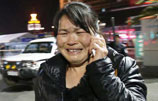3 Gulf Arab states recall top envoys to Qatar
Updated: 2014-03-06 09:07
(China Daily/Agencies)
|
|||||||||||
Saudi Arabia, Bahrain, UAE say Doha broke regional security pact
Saudi Arabia, the United Arab Emirates and Bahrain said on Wednesday they were withdrawing their ambassadors from Qatar because Doha had not implemented an agreement among Gulf Arab countries not to interfere in each others' internal affairs.
The three Gulf Arab states made the announcement in a joint statement on state media, saying Qatar had breached a regional security deal. They said the move was made to protect their security.
Qatar said on Wednesday it regretted the decision of three fellow Gulf monarchies to recall their envoys to Doha, but pledged not to withdraw its own ambassadors from those countries.
Doha said the decision by Bahrain, Saudi Arabia and the UAE was linked to "differences over issues outside the GCC", in an apparent reference to differing policies mainly regarding Egypt.
Tensions between the three and Doha intensified following the ouster of then Egyptian president Hosni Mubarak in "Arab Spring" protests in early 2011. Mubarak was long seen as a reliable Saudi ally and one whose disdain for Islamist groups was in line with the kingdom's own.
Qatar's massive financial and public support for Mubarak's successor, ousted president Mohammed Morsi, who hails from the Brotherhood, stood at odds with UAE and Saudi policies - as did its condemnation of Morsi's ouster in July by the Egyptian military.
The move is unprecedented in the three-decade history of the Gulf Cooperation Council, a pro-Western alliance of Saudi Arabia, Bahrain, Kuwait, Qatar, the UAE and Oman.
Qatar has been a maverick in the conservative region of hereditary monarchies, backing Islamist groups in Egypt, Syria and elsewhere in the Middle East that are viewed with suspicion or outright hostility by some fellow GCC members.
Saudi Arabia and the UAE are fuming especially over Qatar's support for the Muslim Brotherhood, an Islamist movement whose political ideology challenges the principle of dynastic rule, and by its playing host to its spiritual leader, Yusuf Qaradawi.
The statement said GCC members had signed an agreement on Nov 23 not to back "anyone threatening the security and stability of the GCC whether as groups or individuals - via direct security work or through political influence, and not to support hostile media".
Saudi and other Gulf Arab officials often complain in private about Qatar's Al Jazeera television station, which they see as being openly supportive of the Brotherhood and critical of their governments. Al Jazeera says it is an independent news service giving a voice to everyone in the region.
The Saudi-UAE-Bahraini statement said GCC foreign ministers had met in Riyadh on Tuesday to try to persuade Qatar to implement the agreement.
"But unfortunately, these efforts did not result in Qatar's agreement to abide by these measures, which prompted the three countries to start what they saw as necessary, to protect their security and stability, by withdrawing their ambassadors from Qatar starting from today, March 5, 2014," the statement said.
Qatar's Foreign Ministry said it would respond later.
Qatar has played a weighty role in promoting Arab Spring protests, saying it has stood consistently with ordinary Arabs against oppression. It has sought to elevate its international profile through a global investment push, the 1990s launch of Al Jazeera and its successful bid to host the 2022 soccer World Cup tournament.
Related Stories
Saudi-Qatar rivalry divides Syrian opposition 2014-01-16 09:47
China, Arab League to deepen ties 2014-01-24 10:09
Chinese FM pledges support to Arab countries 2013-12-22 16:42
Today's Top News
Premier puts the accent on reform
Iceland to work closer with China on Arctic development
Beijing plans 12.2% boost in military spending
What will China be like in 10 years?
Li opens congress with strong first report
Putin: Force 'last resort' in Ukraine
Obama releases 2015 budget request
Peace quest spurs defense push
Hot Topics
Lunar probe , China growth forecasts, Emission rules get tougher, China seen through 'colored lens', International board,
Editor's Picks

|

|

|

|

|

|





